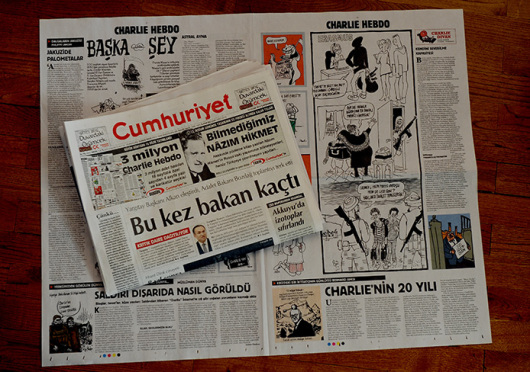
Turkish Newspaper Cumhuriyet printed a four-page selection of cartoons and articles on Wednesday in a show of solidarity with Charlie Hebdo but left out cartoons which Muslims may find offensive. However, two Cumhuriyet columnists Hikmet Cetinkaya and Ceyda Karan used small, black-and-white images of the Charlie Hebdo cover as their column headers in Wednesday’s issue. Ankara, Turkey, January 14, 2015. Credit: Courtesy of TNS
Last week’s attack on the French satirical magazine Charlie Hebdo spurred discussions of free speech across the world, and at Ohio State. A professor and an expert said while the publication’s cartoons could be offensive, they’re an important part of free speech rights and French culture.
On Jan. 7, two gunmen entered Charlie Hebdo’s offices, killing 12 people, including the editor of the magazine, seven other employees and two National Police officers. The main suspects, the Kouachi brothers, were proclaimed Muslims who were allegedly offended by the magazine’s controversial cartoons that pictured the Prophet Muhammad. The two brothers and their friend were killed by police Jan. 9.
Founded in 1970, Charlie Hebdo has long published satirical cartoons that target many societal issues, including politics, race and religions of all kinds. As a strong believer in the notion of laïcité, which means “secularity” in English, its main focus has been public expression of religion.
Patrick Bray, an associate professor of French at Ohio State and an expert on 19th and 20th century French literature and theory, shed light on the ideology behind Charlie Hebdo’s satirical cartoons.
“These ideas are ones that lots of people have, and these images are part of our conscience,” Bray said. “If we repress them, they only get worse. If we can see them and work through them, we’re able to see how ridiculous they are.”
Jenny Robb, curator at the Billy Ireland Cartoon Library and Museum, affirmed Bray’s theory.
“Cartoons are intended to provoke us, to make us think,” Robb said. “They’re intended to expose injustice or corruption, to ridicule people who are in power and to persuade us.”
Robb also said she believes cartoons have immeasurable value.
“In a free society where we have freedom of speech and expression, they can be a very important way of advancing the conversation,” she said.
Robb said she believes deciding whether a publication has crossed the line is subjective, but thinks the cartoons published in Charlie Hebdo have always tested the boundaries of expression.
“I think (Charlie Hebdo) is definitely pushing the envelope of what is appropriate and tasteful,” she said.
Bray said Charlie Hebdo’s borderline offensiveness is a crucial element of French literature and culture like French writer Voltaire.
“The towering figure of Voltaire from the 18th century is seen as someone always fighting for tolerance and the right of people to say anything, even if he doesn’t agree with them,” he said.


